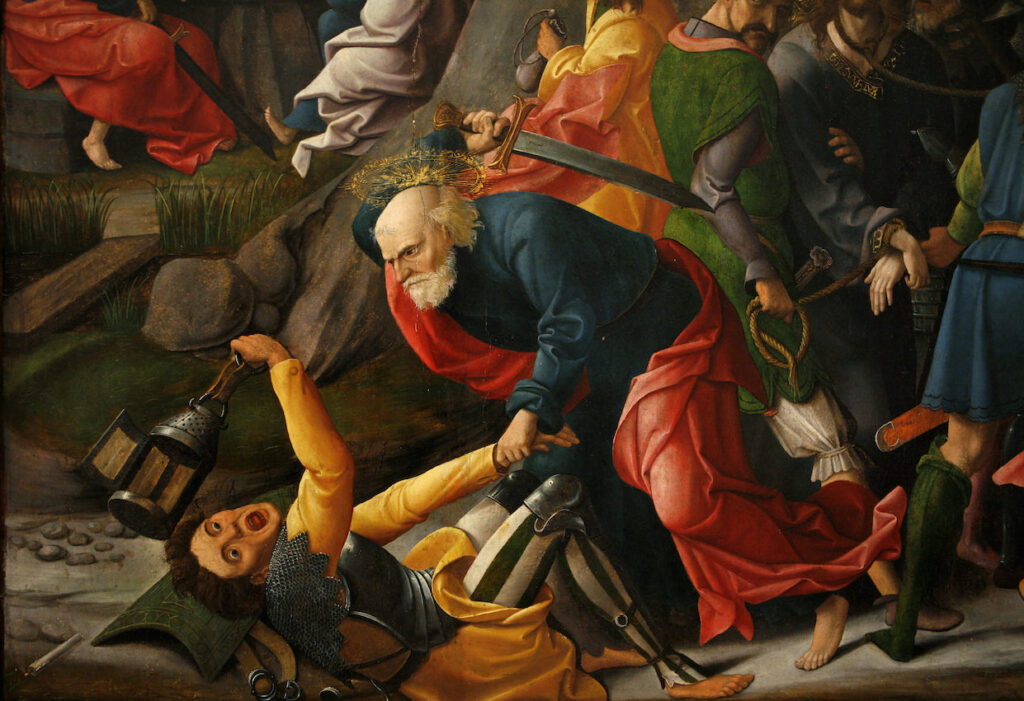
I came across a thought-provoking questioning of the authenticity of that Gospel detail describing the disciples carrying swords as they accompanied Jesus into Gethsemane while translating a famous nineteenth century work by Christian Gottlob Wilke. (“Famous” because it was in Der Urevangelist that Wilke established the case for the priority of the Gospel of Mark.) Wilke was unable to accept this scene of the sword wielding disciple (the Gospel of John attributes the action to the typically impulsive Peter) formed part of the original narrative. Here are his reasons:
Jesus expected that night, as the common account of Matthew 26:31 and Mark 14:27 tells us, only acts of cowardice from the disciples, and the same account follows through on this explicit expectation when it depicts all the disciples fleeing (Matt 26:56, Mark 14:50.) – evidence that the narrator had only planned to carry out the word of the prediction, and that therefore there was no question of an attempted resistance.
The sword is introduced to portray the disciples as resisting the arrest of Jesus — a detail that stands at odds with the theme of prophetic fulfilment that the author has been establishing.
Notice, too, how more naturally the narrative flows once this detail is removed. We begin with Jesus returning from his prayer and speaking to his disciples:
42 Rise! Let us go! Here comes my betrayer!”
43 Just as he was speaking, Judas, one of the Twelve, appeared. With him was a crowd armed with swords and clubs, sent from the chief priests, the teachers of the law, and the elders.
44 Now the betrayer had arranged a signal with them: “The one I kiss is the man; arrest him and lead him away under guard.” 45 Going at once to Jesus, Judas said, “Rabbi!” and kissed him. 46 The men seized Jesus and arrested him. 47 Then one of those standing near drew his sword and struck the servant of the high priest, cutting off his ear.
48 “Am I leading a rebellion,” said Jesus, “that you have come out with swords and clubs to capture me? 49 Every day I was with you, teaching in the temple courts, and you did not arrest me. But the Scriptures must be fulfilled.” 50 Then everyone deserted him and fled.
Is it not strange that the author has Jesus addressing those who have arrested him while making no mention at all of the act that actually belies his words. Jesus implies that his own followers have not come “with swords and clubs” and have not performed any act of rebellion. So how could the author have managed to introduce this episode without any rebuke or explanation from Jesus?
The Jesus we find in the Gospel of Mark, Wilke points out, otherwise consistently addresses any specific act of his disciples. But here he seems not to have noticed what they have just done. Rather, his words indicate that his disciples have fearfully stood by before running to avoid the same fate as Jesus.
If a subsequent curator of the Gospel did add such a detail, one does wonder about the circumstances of their time. Were some Christians justifying armed resistance?
(Wilke makes his case with somewhat more technical detail by pointing to various emphases in the Greek words relating to the disciples fleeing and a more detailed discussion of the sequence of the phrases.)
Wilke, Christian Gottlob. Der Urevangelist oder exegetisch kritische Untersuchung über das Verwandtschaftsverhältniss der drei ersten Evangelien. Dresden ; Leipzig : Gerhard Fleischer, 1838. http://archive.org/details/derurevangelisto0000wilk. p. 495
